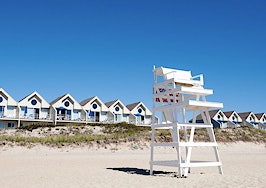When the pandemic first arrived in the U.S., it initially looked like the vacation rental industry in New York’s Finger Lakes region might be an early victim. But then, something surprising happened.
“It was around mid May,” Lindsay Bolton said. “Demand went from nothing to higher than we’ve ever seen before.”

Lindsay Bolton
Bolton is the marketing manager for Finger Lakes Premier Properties, a real estate company in New York state that manages about 300 vacation rentals. The company is the largest of its kind in the region, and Bolton told Inman that contrary to what some prognosticators might have expected back in March, 2020 has ended up being uncommonly busy.
“This year, we’ve had demand that we’ve never seen before,” she explained. “If we had more homes we would have booked them.”
This trend has repeated across the U.S., with managers, property owners and real estate professionals seeing atypically high levels of demand for short-term rentals even into the upcoming fall — a period that historically is the slower “shoulder season.” And overall, this has been a good thing for owners and managers; with demand higher than ever, there’s more money to be made.
But the unprecedented level of demand also creates challenges. What do you do for marketing, for example, when the normal rulebook no longer applies? What can owners charge if demand goes up when it normally goes down?
The short-term rental industry is scrambling right now to figure out answers to these questions, but that scramble also highlights just how unprecedented the age of the coronavirus has become.
Demand is way up
Spiking demand in real estate generally has been a recurring theme this year, and the vacation rental professionals who spoke to Inman for this story said their industry has risen along with the broader market.
Bolton, for example, said that in her area bookings during peak season — which is typically June through August — were up 22 percent year-over-year. In August alone, bookings were up 33 percent compared to the same period in 2019.

A vacation rental managed by Finger Lakes Premier Properties. Credit: Finger Lakes Premier Properties
But the Finger Lakes region didn’t just have a busy summer. Instead, bookings have continued to soar and are now up in September and October an astounding 61 percent year-over-year.
The region’s popular wineries keep demand from ever entirely dropping off even during the slower months, Bolton said. But even so this level of activity is surprising.
“Our arrivals in September are double what they usually are and October is going the same way right now,” Bolton said, adding that the high demand appears to be connected to the high number of people working remotely and the fact that many schools are also doing virtual classes.

Martha Gundersen
Martha Gundersen, a Douglas Elliman agent who works in the Hamptons area of New York, told a similar story. She said shorter-term renters appear to be flocking to the area because “they’re looking for a place of safety” amid the uncertainty of the pandemic. Others are “coming out to see if they like living here.”
But whatever motivations are at play, the area is so busy that winter bookings are already filling up.
“It’s not normal to look for rentals this early in the season for the winter,” she told Inman.
Gabe Weinem, director of sales and guest services with Park City Rental Properties, said the market is similarly hot in his area, which sits in the ski-friendly mountains east of Salt Lake City, Utah. For the fall, revenue is up 160 percent compared to last year, and on the specific day he spoke with Inman last week sales were up 73 percent year-over-year.

Gabe Weinem
“Right now sales are up, definitely,” he told Inman.
Weinem’s colleague Jim Anderson — the director of business development at Park City Rental Properties — added that consumers appear to be especially interested right now in longer duration bookings.
“We’ve had a lot of extended stays where people are working from home,” he explained.
Gundersen mentioned a similar trend in her area, with renters willing to snap up properties for months at a time.
National data also indicates that isn’t just an isolated trend.
An August report that vacation rental company Vrbo provided to Inman concluded that “travel data indicates families want to take longer vacations.” The company — which conducted a survey of hundreds of consumers — specifically found that “interest in one-week and three- or four-week stays have grown relative to the total number of searches, up 25 percent and 15 percent, respectively, compared to the same time last year.”
More generally, Airbnb has also reported rising interest in vacation rentals during the summer. And while not every market is up year-over-year — Hawaii, which requires a lengthy flight for most Americans to reach, was seeing lower-than-usual demand as of August — at least some more accessible parts of the country have seen business pick way up, according to professionals in those markets.
Managers have to learn on the fly
Everyone who spoke with Inman about vacation rentals was happy that the year is turning out better than expected. But it has also required a degree of adaptability that is unusual.
“Right now,” Weinem said, “we’re learning on the fly.”
One of the things that managers are having to adapt to is a shorter booking window. Both Weinem in Utah and Bolton in New York said that right now guests are tending to book stays days or weeks ahead of their check in date rather than months in advance as they have in the past.
“People are much more leery about booking far in advance,” Bolton explained. “Just because they don’t know what’s going to happen this fall.”

A Finger Lakes Premier Properties vacation rental on Keuka Lake. Credit: Finger Lakes Premier Properties
In Weinem’s case, he said the company has been in business long enough and has a firm enough grasp of the market that it can still deal with the shift. Still, he added the “challenge is we don’t know exactly what to expect.”
Pricing also represents a point where managers are having to adapt. In many travel destinations, prices typically dip during the shoulder season as summer vacationers head home.
But things aren’t so clean cut this year.
“September and October prices are probably 50 percent higher than normal because of supply and demand,” Gundersen said of the Hamptons.
She went on to recall one property in the area that rented for $300,000 just for the month of August. She said that in a normal year, that much money would have been enough to nab the house for much of the entire off season.
That’s an extreme case — $300,000 is enough to buy a house in much of the U.S. — but even homes that would normally rent for $15,000 per month are now going for $25,000 in the area.
To be clear, this is a good position to be in for owners and the real estate professionals who work with them. And Gundersen said travelers are showing a willingness to pay the higher rates “as long as they can go in and feel that it’s clean and have sort of a white glove service.”
But it can also mean some extra work. For instance, Bolton said that her company’s biggest competitors are individual mom-and-pop owners who rent out properties on their own. And for such owners, pricing during these unusual times can involve a degree of guess work.
“Some will jack their prices up and see if they can book it,” she said. “It’s more trial and error.”

A vacation rental on Canandaigua Lake. Credit: Finger Lakes Premier Properties
All of the professionals who spoke with Inman for this story said they’ve relied on data-oriented software to price their units. Bolton’s company, as well as that of Weinem and Anderson, also have dedicated pricing staffers whose job it is to figure out what the market rate for a unit ought to be. That has made the process run fairly smoothly, even if it the outcome is conspicuously different from prior years.
But the takeaway from everyone is that there have been significant changes to demand, which means prices have responded, and need to continue responding. This is further compounded by the fact that supply too is lower in some cases: Multiple managers told Inman that not only are travelers snapping up units, but also some owners have concluded that they already made enough money and now want to use, rather than rent out, their secondary homes.
The pandemic has also thrown advertising for a loop. Early on, for example, Park City Rental Properties opted to put its entire staff on marketing duty in order to avoid layoffs. That strategy appears to have paid off when bookings for the summer and fall took off, and Andersen said the company is now focused on frequent communication with owners.
“It’s day by day,” he said in a comment that well sums up the rapidly changing vacation rental market right now.
In Bolton’s case, her firm has tried to tailor its marketing to “where we need the demand.” In a normal year, that might mean working extra hard to fill properties during slow months.
But this fall, the slow months aren’t particularly slow. The result is that while the company is still working hard to fill properties, the focus for creating demand has shifted all the way to the first part of 2021.
“Normally we would still be running specials for September and October at this time,” she said, “but this year we don’t need to.”













